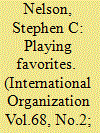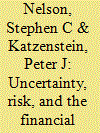| Srl | Item |
| 1 |
ID:
161426


|
|
|
|
|
| Summary/Abstract |
This article examines public opinion toward sovereign debt disputes. Using evidence from multiple surveys fielded in Argentina—the country at the center of the most prominent legal dispute with foreign bondholders—we explore the sources of public support for debt repayment. Our evidence shows that economic self-interest and competing issue frames have little impact on attitudes toward debt repayment in Argentina. Individuals’ opinions toward debt disputes are driven primarily by their longstanding symbolic attitudes. In particular, partisan identity and presidential approval provide the strongest predictors of attitudes toward debt repayment. We also show that partisanship has particularly strong effects for well-informed voters and in periods marked by abundant information about elite positions on this issue. This supports elite-cueing theories of public opinion. These findings may help explain why some governments refuse to settle economically costly disputes with their external creditors.
|
|
|
|
|
|
|
|
|
|
|
|
|
|
|
|
| 2 |
ID:
131496


|
|
|
|
|
| Publication |
2014.
|
| Summary/Abstract |
International organizations (IOs) suffuse world politics, but the International Monetary Fund (IMF) stands out as an unusually important IO. My research suggests that IMF lending is systematically biased. Preferential treatment is largely driven by the degree of similarity between beliefs held by IMF officials and key economic policy-makers in the borrowing country. This article describes the IMF's ideational culture as "neoliberal," and assumes it to be stable during the observation window (1980-2000). The beliefs of top economic policy-makers in borrowing countries, however, vary in terms of their distance from IMF officials' beliefs. When fellow neoliberals control the top economic policy posts the distance between the means of the policy team's beliefs and the IMF narrows; consequently, IMF loans become less onerous, more generous, and less rigorously enforced. I gathered data on the number of conditions and the relative size of loans for 486 programs in the years between 1980 and 2000. I collected data on waivers, which allow countries that have missed binding conditions to continue to access funds, as an indicator for enforcement. I rely on indirect indicators, gleaned from a new data set that contains biographical details of more than 2,000 policy-makers in ninety developing countries, to construct a measure of the proportion of the top policy officials that are fellow neoliberals. The evidence from a battery of statistical tests reveals that as the proportion of neoliberals in the borrowing government increases, IMF deals get comparatively sweeter.
|
|
|
|
|
|
|
|
|
|
|
|
|
|
|
|
| 3 |
ID:
131501


|
|
|
|
|
| Publication |
2014.
|
| Summary/Abstract |
The distinction between uncertainty and risk, originally drawn by Frank Knight and John Maynard Keynes in the 1920s, remains fundamentally important today. In the presence of uncertainty, market actors and economic policy-makers substitute other methods of decision making for rational calculation-specifically, actors' decisions are rooted in social conventions. Drawing from innovations in financial markets and deliberations among top American monetary authorities in the years before the 2008 crisis, we show how economic actors and policy-makers live in worlds of risk and uncertainty. In that world social conventions deserve much greater attention than conventional IPE analyses accords them. Such conventions must be part of our toolkit as we seek to understand the preferences and strategies of economic and political actors.
|
|
|
|
|
|
|
|
|
|
|
|
|
|
|
|